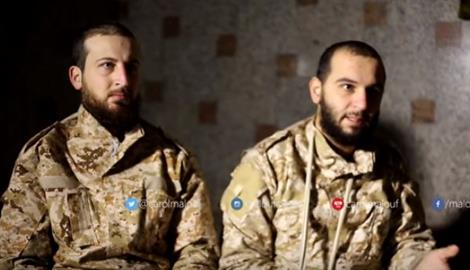Captured Hezbollah members “received little training”
Now Lebanon/February 09/16
BEIRUT – Lebanese journalist Carol Malouf has released the entirety of her interview with two Hezbollah members held captive by Al-Nusra Front in Syria, less than a week after local station MTV aired a substantially abbreviated version of the video after coming under pressure from the party.
In the one-hour video—published Monday on YouTube—Hassan Nazih Taha and Mohammad Mehdi Shuaib spoke at length about their deployment as Hezbollah technicians in Syria, working alongside the party’s fighters aiding the Bashar al-Assad regime. All of the Hezbollah members’ statements were made while in captivity and do not necessarily reflect the true views of the prisoners. Their statements may have been made under duress, direct or indirect.
The technicians, who were taken prisoner in November outside Aleppo, described the scant military training they had received and the blunders that led to their capture by Al-Nusra Front. The two young men, one of whom still bore wounds he said he suffered during his capture, explained that every Hezbollah member is obliged to fulfill one 15-day military posting (‘murabata’) per year along one of the party’s “front-lines.”
“As the front in the south is inactive and there is no war there, and because the battles have moved to the north, to Syria, Hezbollah has moved all the battlefront locations and the fighting locations to Syria,” Taha told Malouf.”So the mandatory ‘murabata’ is now in Syria.”Despite facing the prospect of fighting in war-torn Syria, both of the Hezbollah captives said they were motivated to join the party due to sectarian sentiments, financial incentives and the belief they were defending Lebanon.
Little training, lost on frontlines
The Hezbollah members said that they had received little military training and served on the frontlines in support positions but not as fighters. Shuaib, who started working for Hezbollah in 2007 as a computer technician, told Malouf that he and his colleague Taha were communications specialists.
“Military, I have [taken] the one course that everyone in the party takes… It’s called the fighter course,” he said.
“The level of my military experience [can be] considered low. I did [the course] when I was [in] ta’bia [reserves] before I was regularized in 2013.”
The purported account of the two mens’ capture at the hands of Nusra points to their low level of training and preparedness for combat in Syria.
Taha said the two of them were ordered to go to the Jabal al-Eis area southwest of Aleppo—near the frontlines where Hezbollah troops and Iraqi militias battled insurgents—to set up antennas for radio communication.
“There was no-one to go with us,” said Taha. “On the way there in the afternoon [the route] was fairly obvious, the road was clear. So we went, but it took us a long time to finish. We stayed till, perhaps, after 19:00. Night had fallen and it was dark. It was the first time we’d been to that area in our lives.”
“On the way back, instead of going left, which was the way back to where we had come from, we went straight on. We got lost on the road. We had no idea. We were lost. We reached a [certain] point and then we were fired upon.”
Although both the young men blamed themselves for their capture, they also criticized the security procedures in southwestern Aleppo.
“We were truly surprised. How had they sent us when the area still wasn’t secure? There were mistakes. There were mistakes,” Shuaib said regretfully.
“Even the big mistake—that we lost our way—[was partly our fault] but why hadn’t they set up a checkpoint?… They hadn’t closed the road.”
Financial incentives
During the course of the interview it became clear that financial incentives and pressures played a role in not only why the men went to Syria, but also why they joined Hezbollah in the first place.
Taha—who worked as a teacher—said that he was partly motivated to join the party by economic reasons, saying that in “education you get the minimum wage, but with Hezbollah you get slightly over the minimum wage.”
“So the matter becomes one of converging interests, between creed and living.”
His colleague, Shuaib, in turn said he felt he could not leave the party in 2013 when obliged to deploy to Syria because he feared losing his job as a computer technician.
“If I say no, I would think to myself, organizational procedures will be taken against me. Maybe it could reach the point of dismissal: I’d be fired from work,” he said.
Both of the young men received a meager financial compensation for deploying to Syria. Shuaib explained that prior to the Syrian conflict, Hezbollah members would receive approximately $4 a day for fulfilling their 15-day mandatory ‘murabata’ service in non-combat zones in the south. Members now receive this compensation, called a ‘hajz,’ for serving with Hezbollah in Syria.
“Stirring up sectarianism”
The captive Hezbollah fighters said that they had been influenced by sectarian rhetoric long prior to going to Syria to fight on behalf of the Assad regime. The men painted a picture of their upbringing in the Bekaa and southern Lebanon, where they were indoctrinated by Hezbollah’s Imam al-Mahdi Scouts program from a young age through a series of cultural and para-military activities. As the war worsened in Syria, and Hezbollah stepped up its political and military support for the Syrian regime, the fighters said they heard propaganda about foreign “mercenary fighters”—some of them prisoners released from Gulf states—flocking to Syria to threaten Shiites.
“There was sectarian pressure: ‘They are coming to demolish our shrines, they are going to take our women prisoner,'” Taha told Malouf, giving examples of commonly voiced fears among members of his community.
The Hezbollah member added that many Shiites believed Sunni Islamist rebels were “coming to kill us, especially [after] the things that happened on the borders… and the rockets that struck the Bekaa area,” a reference to the Syrian militant strikes on Shiite populated areas in eastern Lebanon. “This contributed greatly to the stirring-up of sectarianism,” he said. The two fighters also said that they had believed “mercenary” Sunni fighters battling the Assad regime wanted to destroy the Sayyeda Zeinab shrine near Damascus, an important pilgrimage site for Shiite Muslims, the defense of which became a rallying cry for Shiite militias fighting alongside the Syrian army.
“People would say ‘mercenaries have come from abroad… and written [in public places]: Sayyeda Zeinab you will go with the regime,'” Shuaib said. “It’s those people who came from abroad, not the Syrians, who want to get rid of the shrines.”
His colleague Taha, in turn, said that Hezbollah fighters “hear” that Sunnis are a “community that hates the imams and the line of Imam Ali,” in reference to figureheads of Twelver Shiite Islam. “They hate Shiites and they hate such-and-such… They have an obsession with this subject,” he added giving examples of commonly repeated phrases.
Hezbollah pressured MTV to cut interview
Maalof’s exclusive video interview with the Hezbollah captives was originally slated to be aired by Lebanese broadcaster MTV on February 3, however the piece was slimmed down to a mere seven-minute segment on the physical and psychological health of prisoners.
Malouf told NOW on Wednesday that she had initially agreed with MTV to air thirty minutes of the footage she recorded during a trip to Syria in December in which she interviewed the two captives.
The journalist said that the MTV was pressured by several Hezbollah officials who called Walid Abboud, the presenter of the show on which the interview was to be aired; Gabriel al-Murr, the owner of MTV; and Malouf herself.
“Somebody leaked the information to Hezbollah from inside MTV,” said Malouf. “First, Walid received a phone call from somebody in Hezbollah, but not very senior, [telling him] ‘I’m giving you advice, it’s probably better if you don’t air it,’ and things like this.”
“Then somebody more senior called Gabriel al-Murr […] and told him literally that ‘this interview does not serve the purpose of Hezbollah or MTV’.”
Following that call, Murr sought to axe the interview altogether, said Malouf. After lengthy debates on Monday and Tuesday, during which time Malouf was also contacted by Hezbollah exerting further pressure, it was agreed that seven minutes of the less “controversial” footage would be aired.
MTV was not immediately available for comment on the matter, hours before the episode of the bi-weekly Bi Mawdouiyeh (“Objectively”) program was set to air.
Hezbollah, for its part, has made no mention of the matter, although an online outlet supportive of the party reported Tuesday that Hezbollah had “made a number of calls to MTV at the highest of levels in order to stop the channel” from broadcasting a tape of its captured fighters.
Exclusive sources told the site—whose editor-in-chief Fadi Nazzal is close to Hezbollah’s ally, the Amal Movement—that Hezbollah could “resort to asking Lebanon’s National Audiovisual Media Council to convene and take a decision to forbid the showing of the video clip.”
Hezbollah has a longstanding policy of not commenting to NOW.
NOW’s English news desk editor Albin Szakola (@AlbinSzakola) wrote this report. Ullin Hope translated the Arabic-language source material.
**Carol Malouf’s full interview with captured Hezbollah members Mohammad Shuaib and Hassan Taha. (YouTube)
http://youtu.be/dw-fVbuerXM






















